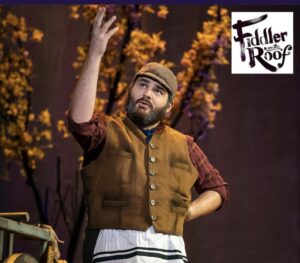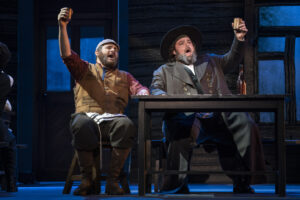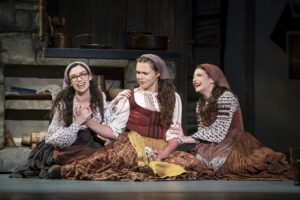Fiddler on the Roof
Joseph Stein (Book); Jerry Bock (Music); Sheldon Harnick (Lyrics)
BroadwaySF

After its record-setting, award-winning initial run on Broadway in 1964; its five Broadway revivals since; countless openings on local and touring stages globally and in towns and cities from coast to coast in America – not to mention the 1971 film whose scenes are now emblazoned in the memories of tens of millions worldwide – how can an outing to see Fiddler on the Roof be much more than a repeat experience for the majority of today’s audiences? Who among theatre-going audiences does not know most of the words of the now-iconic songs (lyrics by Sheldon Harnick and music by Jerry Bock) and who cannot quote lines left and right from favorite scenes (book by Joseph Stein)? Weddings everywhere still employ “Sunrise, Sunset” as a mood-setter; and almost anyone may at some point use phrases like “Tradition, tradition,” “If I were a rich man,” or “Do you love me?” in often silly, sung manners to make a point or get a laugh. And then there are the Tevye’s of the past of which many patrons probably have an absolute favorite – Topel, Zero Mostel, Herschel Bernardi, Harvey Fierstein, etc. Who would dare compete? How possibly can yet one more visiting tour of Fiddler be anything but be a dusted-off retread of our collective, past experiences with one of America’s best-loved, most-familiar stories and musicals?
Actually, that is not at all a problem for the current, national tour of the 2015, much-acclaimed Broadway revival of Fiddler on the Roof, now briefly visiting the stage of Golden Gate Theatre as part of BroadwaySF offerings. This touring company began its continental excursion of the U.S. and Canada in 2018, halted for eighteen months due to COVID, and resumed touring to this day in August 2021. In fact, this production visited San Jose in May 2019, with the current San Francisco show retaining and even improving all the exceptional, memorable elements of that production.
Under the direction of Bartlett Sher, this long-running, touring Fiddler explodes in contemporary freshness of concept while retaining enough of what we all remember fondly. The result is a Fiddler on the Roof ready to reignite returnees’ love and to introduce a whole new generation to a story that, in the end, is about forced immigration and its profound effects on families and their traditions and histories – a storyline now more relevant than ever. From scenic elements to lighting to the stage-filled dancing to even Tevye himself, there is much to surprise and wow any audience member – whether one who has seen a production or the movie a dozen times or this, the first time.
As in any production of Fiddler, it does all begin with Tevye himself. Israeli actor and child of Holocaust survivors, Jonathan Hashmonay, immediately establishes himself as more than worthy to be the latest to step into this titular role, bringing to his Tevye both fresh, new and old, familiar mannerisms. He speaks with a lilt and style more contemporary that the heavy accents of 1905 Russia most of us are accustomed in our Tevye’s, and yet he still has the shaking shoulders and raised, fisted arms during “If I Were a Rich Man.” His sung vocals are often lighter, more nuanced, and fuller of a wide range of emotional display than those of the oft gruffer and ‘bear-ish’ voices of his famous predecessors (all of which, by the way, I personally still admire and love to hear over and again on recordings).

Like they, he delightfully delivers Joseph Stein’s many endearing and hilarious lines as he converses with God, providing his own unique combination of a wonderful twinkle in his eye and the near-exhausted frustration of his bent shoulders – lines like “Dear God, it’s true we are the chosen people, but sometimes why could you not choose someone else?” Like they, he is especially cute and playful when he prods his wife Golda with “Do You Love Me?”; but his uniquely sustained, roller-coaster way of saying “love” brings even more fun to the song. His “Little Bird” softly, sweetly sung as perhaps he remembers once putting down his little girl, Chava, for a nap – a grown daughter he now rejects after her marriage a Russian Catholic – ends in a crumpled, heaving collapse that will long linger in audience memories. As this latest Tevye, Jonathan Hashmonay is certainly generating his own set of new fans for whom he will be the face and voice of their remembered Tevye.
Among this massive and to-a-person highly talented cast of thirty-three, others step forward to take their rightfully deserved place of honor in the long line of those who have memorably had their roles in the past. Maite Uzal is Golda, the touring production’s one lead who has fortunately returned after the COVID interruption. Her Golda has an irritable, no-nonsense edge that clearly comes from a life of pre-dawn to post-dusk household and garden tasks by the dozens. Her smiles are rare; her time for gossip and chitchat is nil; her patience runs thin. Tevye’s playful but stubbornly persistent “But, Golda, do you love me?” finally leads to an eruptive roar, “I’m your wife!” Her Golda then sings in a voice with cello richness and depth to tell him all the reasons of why she finally, almost sweetly admits, “I suppose I do.” A memory maker herself whose performance I so fondly recall from 2019, Maite Uzal continues to be a Golda magnificent.

As the three daughters who one-by-one test their papa’s boundaries with their marrying by will and not by his decree, Leah Platt (Tzeitel), GraceAnn Konotak (Hodel), and Yardén Barr (Chava) each has a chance to prove herself individually, with the three collectively delighting as playfully teasing teenagers in their “Matchmaker, Matchmaker.” Hodel’s “Far From the Home I Love” is particularly poignant as she contemplates leaving her family to join her beloved Perchik in Siberia. Staring off into a horizon scary and unknown, GraceAnn Konotak sings in heart-felt, hushed notes, pausing on many to underscore the love she feels for both family and her Perchik.
Each of the wooing, young men makes a mark for himself as well. The visiting scholar and political activist from Kiev, Perchik (Austin J. Gresham) brings a bold, firebrand zealousness that Tevye reluctantly admires and that the village initially mocks but then takes notice when he leads them to break with tradition of men and women always dancing separately. In his duet with Hodel (“Now I Have Everything”), his voice rings with palpable bursts of new-found happiness in his love for her. But it is his firmly spoken, “We are not asking for your permission, only your blessing” to Tevye when the two lovers declare their intended marriage that truly stands out.
As Fyedka, Carson Robinette comes into the story late as the young, easy-going Russian befriending and then falling in love with Chava. Fyedka has no songs awarded him; but his tall, kind, and yet bold and brave leaves a lasting impression.
However, as often in other productions, it is the poor tailor, Motel Camzoil, who touches hearts the most. Elliot Lazar is shaking, scared, and almost speechless when we first meet him, especially when in the presence of Tevye (even hiding under Tevye’s milk cart to avoid facing his future father-in-law). We instinctively want to hug and protect him while we also cannot help but laugh at his ridiculous, retreating antics and his boyish cries to Tevye of “Please don’t shout at me” as the musters up the courage to ask for Tzeitel’s hand in marriage (one of the evening’s best scenes among many great ones). But Elliot Lazar seals the deal as his own unique Motel when he sings “Miracle of Miracles” with an initial voice full of youth and giddiness that bit by bit transforms with increased courage into “God has made a man today,” full of deeper-voiced bravado, ready to take his bride.
Throughout the evening, each scene seems somehow to be even better than the one preceding it that could have only been described a few minutes ago in a list of superlatives. Scenic elements themselves, designed by Michael Yeargan, take the massively empty stage and fly magically in from all directions to metamorphose into a milkman’s humble abode with outdoor kitchen, a local tavern, or an entire village of houses hanging in the sky above. The lighting of Donald Holder is almost indescribable in its scene-setting beauty, with slanted sun beams connecting a spotlighted Tevye with his God for an intimate conversation or with dappled shadows mixing with an array of richly deep celestial colors to set up a song of proclaimed love. The costumes of Catherine Zuber illustrate long-held traditions, superstitions, and beliefs while also punctuating the changing attitudes among the young as well as the inherent differences of those Russians not a part of this tight, Jewish community.
Clarinets play a big part in accompanying the scenes and the singers in any Fiddler, and Megan Trach and Bradley Frizzell beautifully provide both spirited and haunting melodies that leave their own lasting impressions. Music Director Jonathan Marrow conducts the fine orchestra of sixteen. Ali Arian Molaei is The Fiddler himself, whose oft-background and silhouetted presence, familiar melody, and knowing looks at Tevye are reminders of how tenuous and precious the daily lives of these villagers are.
It is in the spectacular scenes of dreams and dance directed by Bartlett Sher where this Fiddler, again like others before it, may be best recalled years from now. The screeching warnings of Grandma Tzeitel (Emily Qualmann) and the giant, long-fingered specter of Frumma-Sarah (Rosie Webber) with her railing siren of sung threats are both a part of a stage filled with dancing, ghastly, masked ghosts in “Tevye’s Dream.” From arm-raised, shaking, and swaying papas, mamas, sons, and daughters in “Tradition” to the frenzied mixture of Jewish and Russian hard stomps and high steps in “To Life” and on to the jaw-dropping, stage-width, knee-slides with bottles teetering on hats in “The Wedding,” the recreated choreography of Christopher Evans reigns supreme with both its homage to the original of Hofesh Shechter but adding its own unexpected newness. That is especially true in the way Mr. Evans’ choreography utilizes so impressively and in many, different ways total ensemble and smaller clusters of synchronized, uniform moves that then suddenly change into a kaleidoscope of patterned, differentiated moves.
Whether it is The Sound of Music, My Fair Lady, The Wizard of Oz, or any of several dozen other Great American Musicals that are now decades old and yet still perennial favorites, revivals can be both welcomed and dreaded. This touring revival of Fiddler on the Roof is in the end not only welcomed but a reason to celebrate; for not only does the touring company on the BroadwaySF’s Golden Gate stage proudly recall many aspects we all cherish of past productions, this Fiddler glistens with its own, more contemporary way of telling a story of that important moment in history well over a century ago we must never forget. It is a welcome “miracle of miracles” that this touring Fiddler survived its COVID interruption and continues to thrill audiences five years after its inception.
Rating: 5 E
A Theatre Eddys Best Bet Production
Fiddler on the Roof continues through March 26, 2023, on tour in BroadwaySF’s Golden Gate Theatre, 1 Taylor Street, San Francisco, CA. Tickets are available online at https://broadwaysf.com/ or in person at the Golden Gate Box Office, Wednesday 11 a.m. – 8 p.m., Thursday – Friday 4 p.m. – 8 p.m., Saturday 11 a.m. – 8 p.m., and Sunday 11 a.m. – 7 p.m.
Photo Credits: Joan Marcus

Leave a Reply